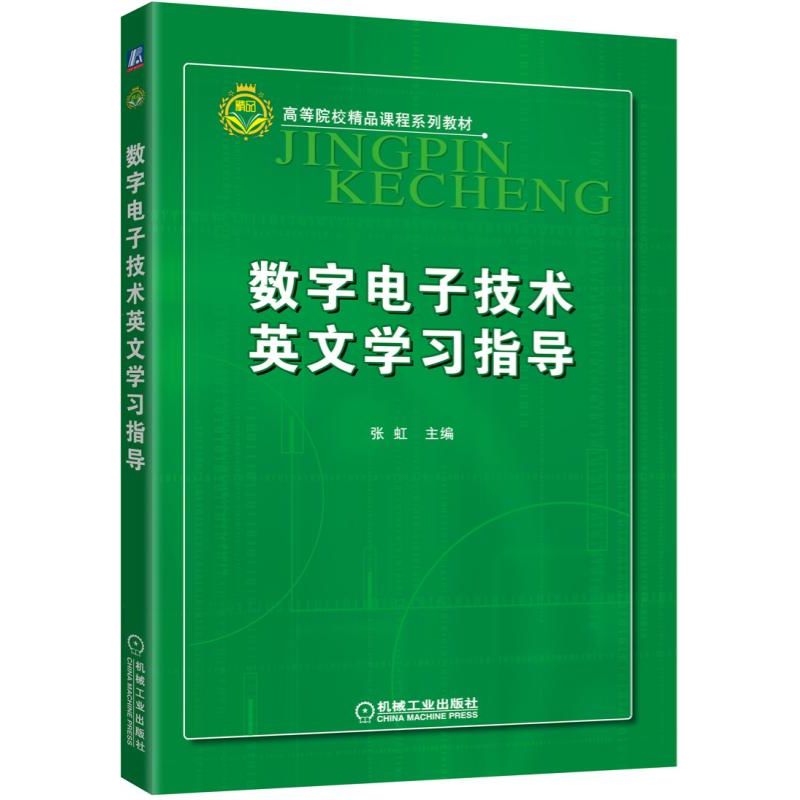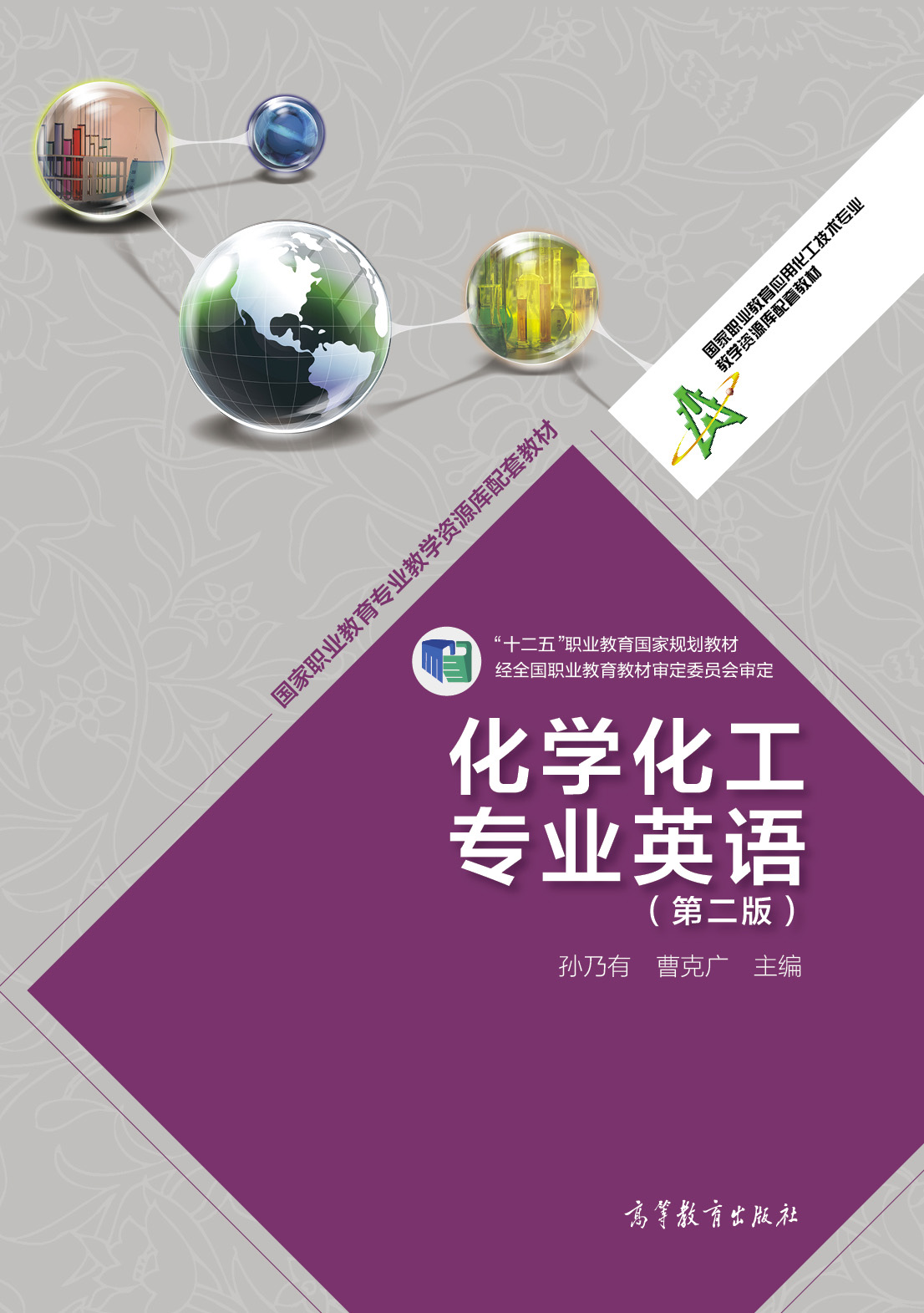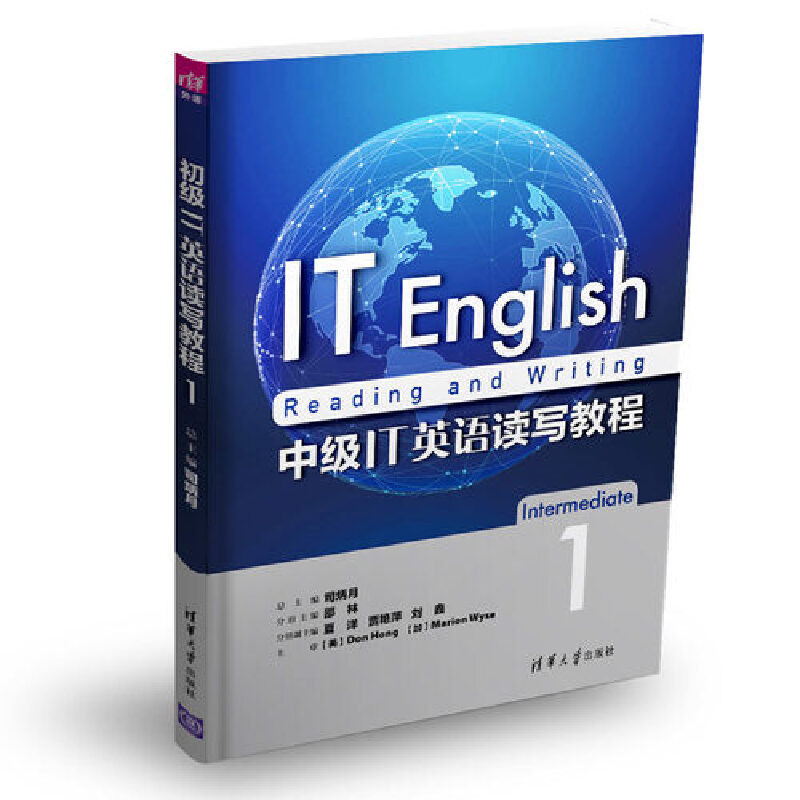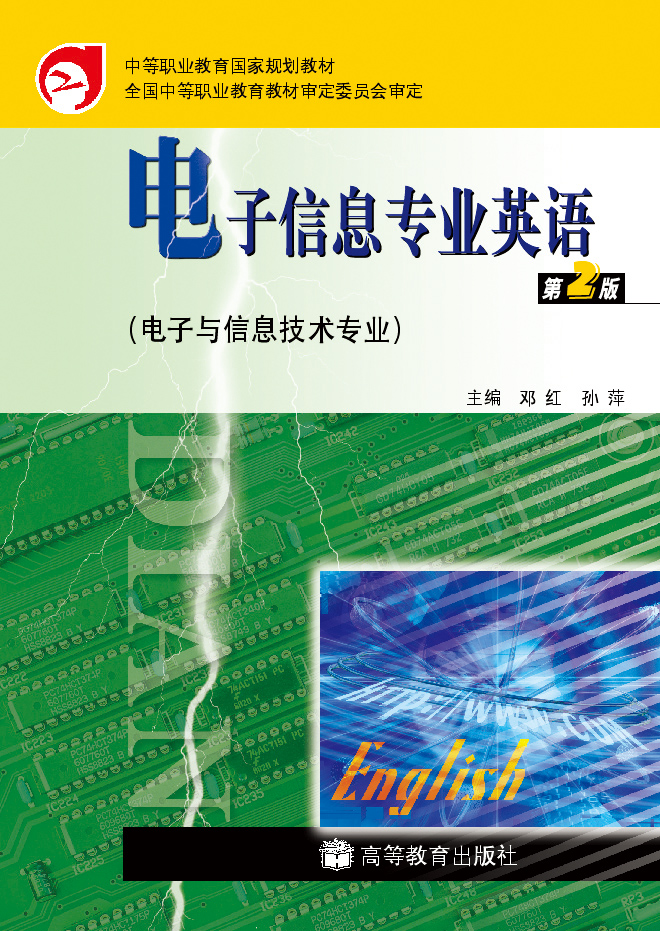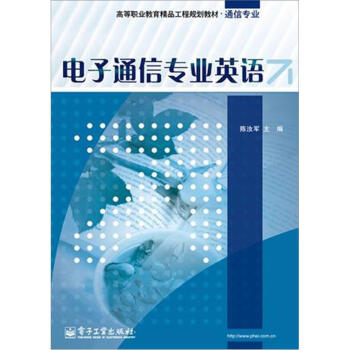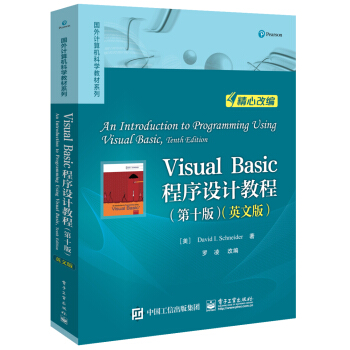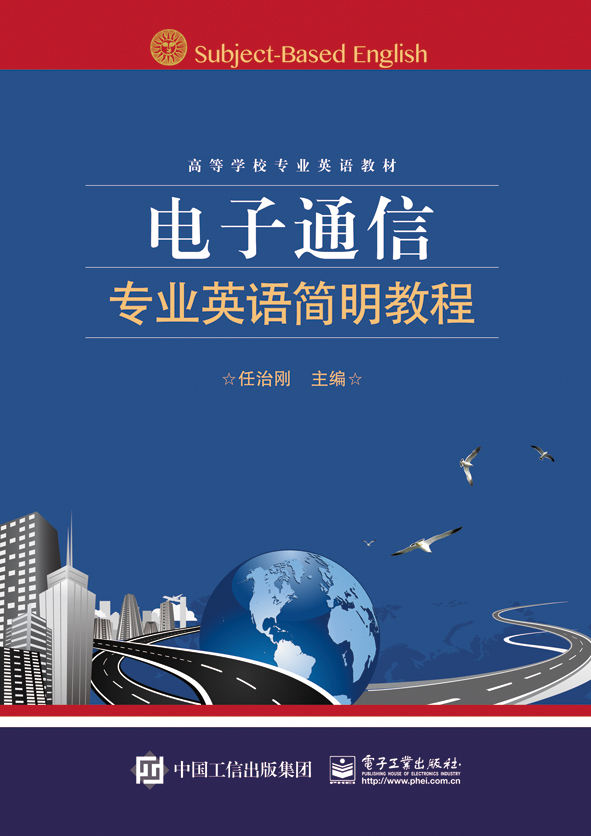数字电子技术英文学习指导 / 高等院校精品课程系列教材
定价:¥35.00
作者: 张虹
出版时间:2016-07
出版社:机械工业出版社
- 机械工业出版社
- 9787111536949
- 1-1
- 141807
- 44217567-5
- 2016-07
- 318
- 203
内容简介
本书是为配合数字电子技术双语和全英文教学的需要而编写的,主要与Thomas L. Floyd主编的《Digital Fundamentals》配套使用,也可用于其他英文电子技术教材的学习指导。书中各章对基本概念、主要知识点和重要内容进行了概括和总结,给出了专业词汇的英汉对照,并提供了自测题和综合性较强的习题供读者练习,同时提供全部习题答案。另外,本书选录了西安交通大学近年来数字电子技术双语课程考试题,供读者参考。
本书共8章,语言以英文为主。内容包括Digital Basics,Integrated Circuit Technologies,Combinational Logic Circuits and Functions,Latches&Flip- Flops&Timers,Counters & Shift Registers,Memory and Storage,Programmable Logic Devices,A/D and D/A Conversions。
本书可作为高等院校电气工程、计算机科学与技术、控制科学与工程、电子信息工程、生物医学工程等专业本科生数字电子技术双语和全英文课程的辅导教材,也可作为教师教学及相关技术人员的参考用书。
本书共8章,语言以英文为主。内容包括Digital Basics,Integrated Circuit Technologies,Combinational Logic Circuits and Functions,Latches&Flip- Flops&Timers,Counters & Shift Registers,Memory and Storage,Programmable Logic Devices,A/D and D/A Conversions。
本书可作为高等院校电气工程、计算机科学与技术、控制科学与工程、电子信息工程、生物医学工程等专业本科生数字电子技术双语和全英文课程的辅导教材,也可作为教师教学及相关技术人员的参考用书。
目录
目 录
前言
Chapter 1 Digital Basics1
1.1 Key knowledge1
1.1.1 Number systems, operations and codes1
1.1.2 Logic gates4
1.1.3 Laws and rules of Boolean algebra5
1.1.4 Various logic descriptions5
1.1.5 Simplifying the Boolean expressions6
1.2 Key terms7
1.3 Self-test questions8
1.4 Problems and solutions12
Chapter 2 Integrated Circuit
Technologies21
2.1 Key knowledge21
2.1.1 Fixed-function integrated circuit21
2.1.2 Basic operational characteristics and
parameters21
2.1.3 CMOS and TTL integrated gate
circuits23
2.1.4 Open-collector gates24
2.1.5 Tristate gates26
2.1.6 Practical considerations26
2.2 Key terms27
2.3 Self-test questions28
2.4 Problems and solutions30
Chapter 3 Combinational Logics and
Functions39
3.1 Key knowledge39
3.1.1 Combinational logic analysis and
design39
3.1.2 Adders39
3.1.3 Comparators40
3.1.4 Decoders41
3.1.5 Encoders44
3.1.6 Multiplexer45
3.1.7 Demultiplexers46
3.2 Key terms47
3.3 Self-test questions48
3.4 Problems and solutions51
Chapter 4 Latches, Flip-Flops,
and Timers 64
4.1 Key knowledge64
4.1.1 Latches64
4.1.2 Edge-triggered flip-flops68
4.1.3 Timers73
4.2 Key terms77
4.3 Self-test questions78
4.4 Problems and solutions81
Chapter 5 Counters and Shift Registers92
5.1 Key knowledge92
5.1.1 Asynchronous counters92
5.1.2 Synchronous counters94
5.1.3 Up/down synchronous counters95
5.1.4 Cascaded counters96
5.1.5 Shift registers97
5.2 Key terms99
5.3 Self-test questions100
5.4 Problems and solutions104
Chapter 6 Memory and Storage116
6.1 Key knowledge116
6.1.1 Memory basics116
6.1.2 The random-access memory118
6.1.3 The read-only memory121
6.1.4 The flash memory and special types
of memories122
6.1.5 Memory expansion123
6.2 Key terms123
6.3 Self-test questions124
6.4 Problems and solutions126
Chapter 7 Programmable Logic
Devices135
7.1 Key knowledge135
7.1.1 Introduction to programmable logic135
7.1.2 SPLDs137
7.1.3 CPLDs140
7.1.4 FPGAs141
7.2 Key terms144
7.3 Self-test questions145
7.4 Problems and solutions147
Chapter 8 A/D and D/A Conversions158
8.1 Key knowledge158
8.1.1 Converting analog signals to digital158
8.1.2 Converting digital signals to analog160
8.2 Key terms161
8.3 Self-test questions161
8.4 Problems and solutions163
Appendix Examination Papers and
Answers174
Appendix 1174
Appendix 2182
Appendix 3189
Answers to the Examinations194
Appendix 1194
Appendix 2197
Appendix 3200
References203
前言
Chapter 1 Digital Basics1
1.1 Key knowledge1
1.1.1 Number systems, operations and codes1
1.1.2 Logic gates4
1.1.3 Laws and rules of Boolean algebra5
1.1.4 Various logic descriptions5
1.1.5 Simplifying the Boolean expressions6
1.2 Key terms7
1.3 Self-test questions8
1.4 Problems and solutions12
Chapter 2 Integrated Circuit
Technologies21
2.1 Key knowledge21
2.1.1 Fixed-function integrated circuit21
2.1.2 Basic operational characteristics and
parameters21
2.1.3 CMOS and TTL integrated gate
circuits23
2.1.4 Open-collector gates24
2.1.5 Tristate gates26
2.1.6 Practical considerations26
2.2 Key terms27
2.3 Self-test questions28
2.4 Problems and solutions30
Chapter 3 Combinational Logics and
Functions39
3.1 Key knowledge39
3.1.1 Combinational logic analysis and
design39
3.1.2 Adders39
3.1.3 Comparators40
3.1.4 Decoders41
3.1.5 Encoders44
3.1.6 Multiplexer45
3.1.7 Demultiplexers46
3.2 Key terms47
3.3 Self-test questions48
3.4 Problems and solutions51
Chapter 4 Latches, Flip-Flops,
and Timers 64
4.1 Key knowledge64
4.1.1 Latches64
4.1.2 Edge-triggered flip-flops68
4.1.3 Timers73
4.2 Key terms77
4.3 Self-test questions78
4.4 Problems and solutions81
Chapter 5 Counters and Shift Registers92
5.1 Key knowledge92
5.1.1 Asynchronous counters92
5.1.2 Synchronous counters94
5.1.3 Up/down synchronous counters95
5.1.4 Cascaded counters96
5.1.5 Shift registers97
5.2 Key terms99
5.3 Self-test questions100
5.4 Problems and solutions104
Chapter 6 Memory and Storage116
6.1 Key knowledge116
6.1.1 Memory basics116
6.1.2 The random-access memory118
6.1.3 The read-only memory121
6.1.4 The flash memory and special types
of memories122
6.1.5 Memory expansion123
6.2 Key terms123
6.3 Self-test questions124
6.4 Problems and solutions126
Chapter 7 Programmable Logic
Devices135
7.1 Key knowledge135
7.1.1 Introduction to programmable logic135
7.1.2 SPLDs137
7.1.3 CPLDs140
7.1.4 FPGAs141
7.2 Key terms144
7.3 Self-test questions145
7.4 Problems and solutions147
Chapter 8 A/D and D/A Conversions158
8.1 Key knowledge158
8.1.1 Converting analog signals to digital158
8.1.2 Converting digital signals to analog160
8.2 Key terms161
8.3 Self-test questions161
8.4 Problems and solutions163
Appendix Examination Papers and
Answers174
Appendix 1174
Appendix 2182
Appendix 3189
Answers to the Examinations194
Appendix 1194
Appendix 2197
Appendix 3200
References203

